 |
| |
|
News | Events | Commentaries | Publications | Vacancies
|
News
|
 |
Unprecedented rise in global military expenditure as European and Middle East spending surges
According to new data published by SIPRI, world military expenditure reached $2718 billion in 2024, an increase of 9.4 per cent in real terms from 2023 and the steepest year-on-year rise since at least the end of the cold war. Military spending increased in all world regions, with particularly rapid growth in both Europe and the Middle East. The top five military spenders—the United States, China, Russia, Germany and India—accounted for 60 per cent of the global total, with combined spending of $1635 billion.
Read more | Read the SIPRI Fact Sheet | Access the SIPRI Military Expenditure Database
|
|
 |
SIPRI experts lead side events at 2025 NPT Preparatory Committee meeting
On 29 April, SIPRI experts participated in the third meeting of the Preparatory Committee for the 2026 Review Conference of the Parties to the Treaty on the Non-Proliferation of Nuclear Weapons (NPT) in New York. Co-organized with the European Union (EU) and the Hiroshima Organization for Global Peace and Hiroshima Prefectural Government, respectively, the two side events brought together experts and policymakers for discussions on nuclear non-proliferation, peaceful uses of nuclear technology and risk reduction alternatives to nuclear deterrence.
Read more
|
|
 |
SIPRI co-hosts dialogue meeting in Dakar on future of conflict management
On 8–9 April, SIPRI and the Friedrich-Ebert-Stiftung hosted a dialogue meeting in Senegal to kick off their new initiative ‘The New Geopolitics of Conflict Management: The Future of Conflict Management and Peace Operations’. During the event, regional and thematic experts discussed practical ways to adapt multilateral conflict management to present and future challenges. Insights from the meeting will be summarized in a policy brief and presented at a side event of the 2025 Berlin Peacekeeping Ministerial in May.
Read more
|
|
 |
SIPRI delivers intensive online course on WMD non-proliferation and disarmament
On 8–11 April, SIPRI and the EU Non-Proliferation and Disarmament Consortium delivered an intensive online course on weapons of mass destruction (WMD) non-proliferation and disarmament for students of technical disciplines. Over a series of lectures delivered by renowned experts, participants learned about evolving challenges and risks related to nuclear, chemical and biological weapons, including at the intersection with quantum, artificial intelligence and space technologies.
Read more
|
|
 |
SIPRI hosts discussion on Nordic–Japanese cooperation
On 6–7 March, SIPRI hosted a symposium to explore different perspectives on and opportunities for strengthening security cooperation between the Nordic countries and Japan. Experts, policymakers and scholars from Denmark, Finland, Japan, Norway and Sweden discussed shared security concerns and compared threat perceptions, amid growing global uncertainties and a rapidly shifting geopolitical landscape.
Read more
|
|
|
Upcoming events
|
SIPRI to co-host short course on military artificial intelligence
22–23 May 2025
On 22–23 May, SIPRI and the Asser Institute will host a short training course in The Hague on international law and the governance of military technologies driven by artificial intelligence (AI). Instructors will include a diverse group of experts from academia, research institutes and governments. The course is open to policymakers, legal advisors, diplomats and individuals interested in the development, use and governance of AI-enabled military technologies.
Read more | Register
|
|
|
|
|
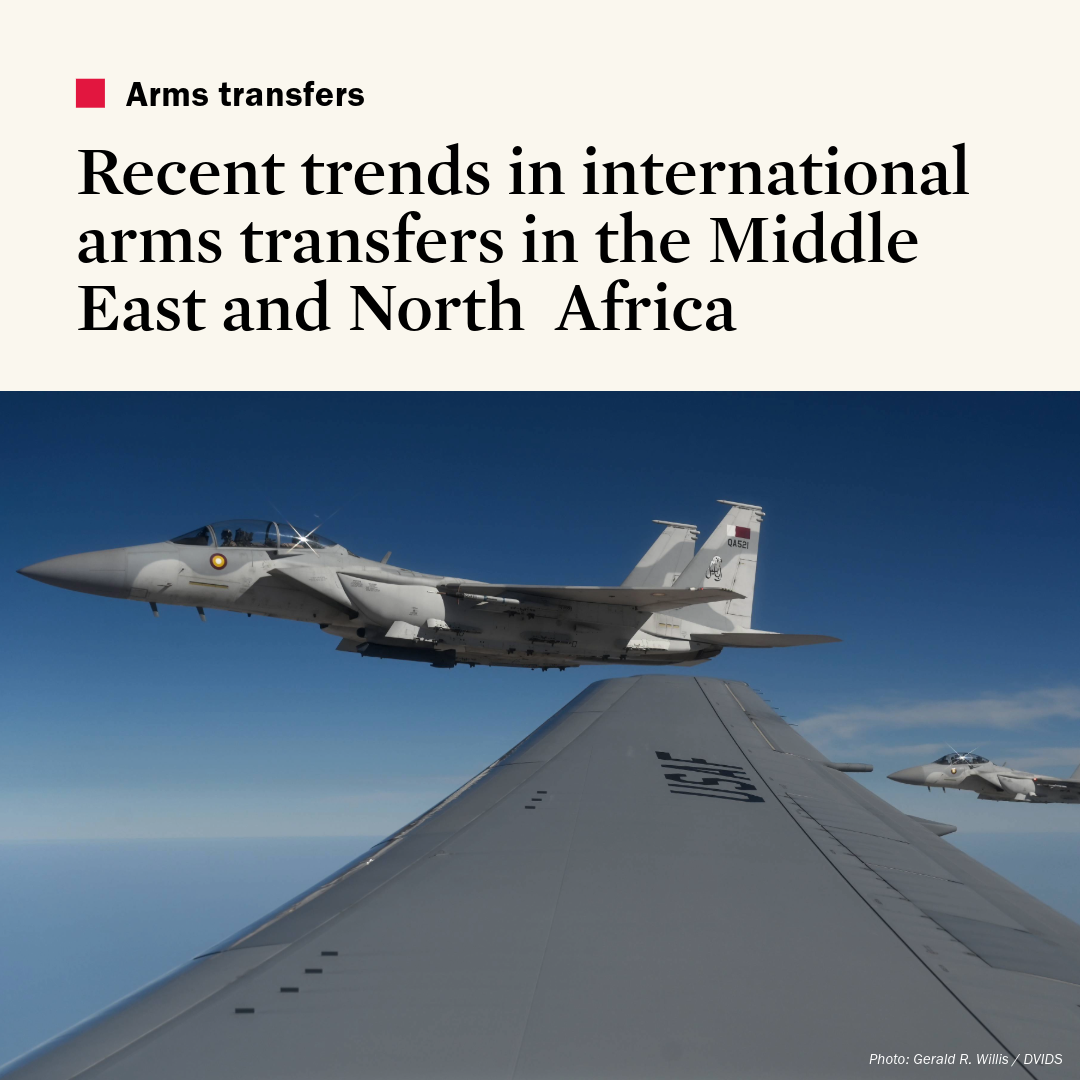 |
Recent trends in international arms transfers in the Middle East and North Africa
The Middle East has long been one of the regions importing the largest volumes of major arms. SIPRI’s latest data on international arms transfers shows that the Middle East accounted for 27 per cent of global arms imports in 2020–24, with North Africa accounting for another 2.2 per cent. This topical backgrounder unpacks recent trends in major arms imports and exports in the Middle East and North Africa, focusing on the largest importers and regional players, as well as on the growing role of some Middle Eastern states as arms exporters.
Read the SIPRI Topical Backgrounder
|
|
 |
SIPRI experts were recently featured in these external outlets:
- ‘Center for Responsible AI: On the Need to Train Future Generation AI Practitioners in Responsible AI’, Vincent Boulanin, published by the Responsible AI for Peace and Security Podcast on 19 March 2025.
- ‘A Risk-Based Regulatory Approach To Autonomous Weapon Systems’, Alexander Blanchard, Claudio Novelli, Luciano Floridi and Mariarosaria Taddeo, published by Digital Society on 3 April 2025.
- ‘GC REAIM Expert Policy Note Series: The Risks of Integrating Generative AI into Weapon Systems’, Vincent Boulanin, published by The Hague Centre for Strategic Studies in April 2025.
- ‘A youth-powered future can deliver peace, security and climate resilience’, Katongo Seyuba, Giulia Jacovella, Maria Kero and Catherine Wong, published by the United Nations Development Programme on 13 April 2025.
|
|
|
Publications
|
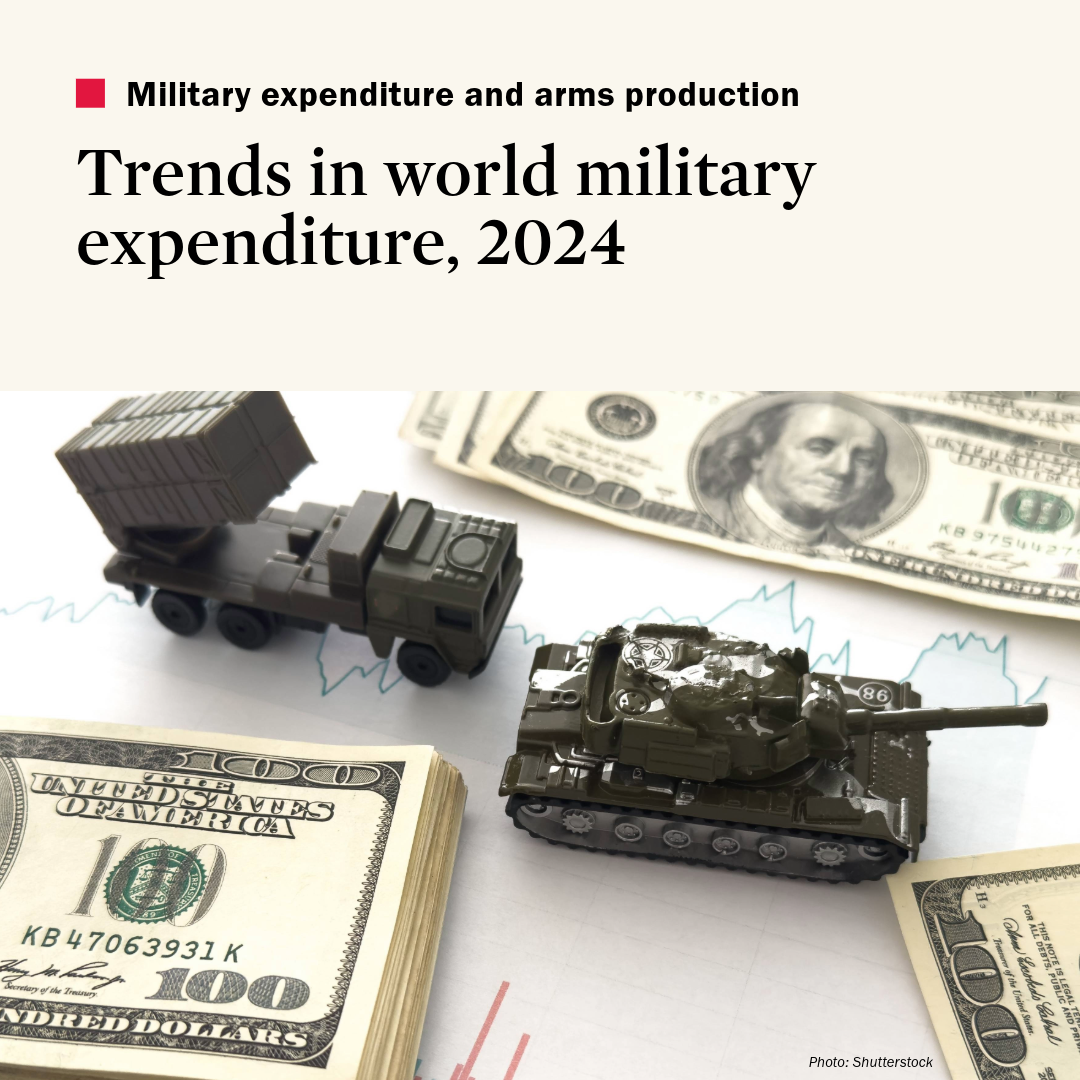 |
Trends in World Military Expenditure, 2024
World military expenditure rose to $2718 billion in 2024, meaning that spending has increased every year for a full decade. The 9.4 per cent increase in 2024 was the steepest year-on-year rise since at least 1988. For the second year in a row, military expenditure increased in all five of the world’s geographical regions, reflecting heightened geopolitical tensions across the globe, including in relation to the ongoing Russia–Ukraine war, the war in Gaza and other conflicts. This SIPRI Fact Sheet examines the regional and national military expenditure data for 2024 and trends over the decade 2015–24.
Read the SIPRI Fact Sheet
|
|
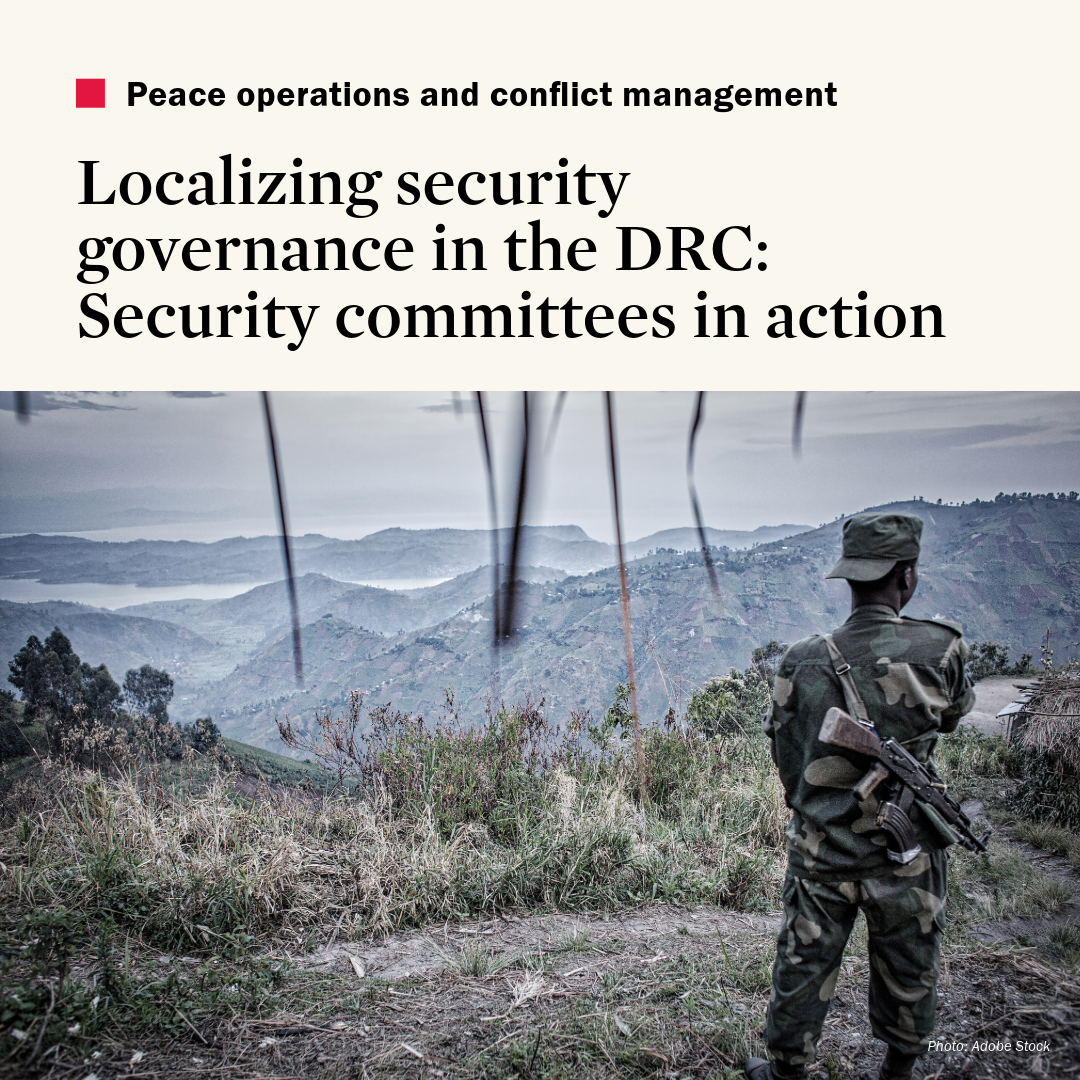 |
Localizing Security Governance in the DRC: Security Committees in Action
In the Democratic Republic of the Congo (DRC), localizing security governance has been increasingly highlighted as an important tool to address security concerns. A network of local security committees is at the core of the government’s effort and policy on localization, holistically working to address insecurity at every level, particularly in the east of the country. This SIPRI Research Policy Paper examines localization within the broader stabilization efforts in the DRC, laying out the positive side effects of and challenges to the committees and providing targeted recommendations for key stakeholders.
Read the SIPRI Research Policy Paper
|
|
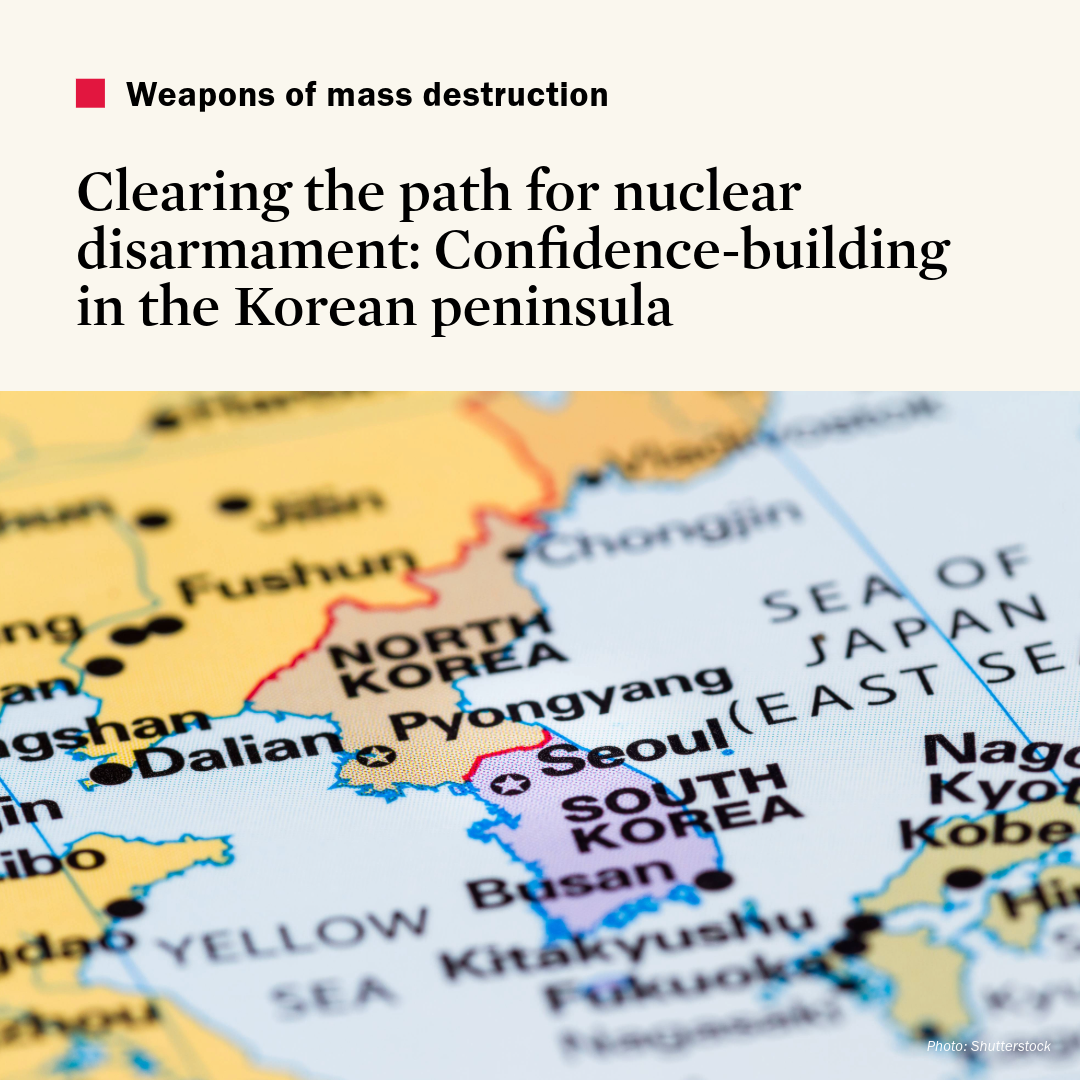 |
Clearing the Path for Nuclear Disarmament: Confidence-building in the Korean Peninsula
While there has been no major conflict in the Korean peninsula for over seven decades, military incidents between the two Koreas are a relatively frequent occurrence. Related risks are magnified by preemptive military doctrines which drive arms race dynamics and lower the threshold for nuclear weapon use. This SIPRI Insights Paper explores possibilities for building confidence in the Korean peninsula to address conflict dynamics and militarization. Calling for an incremental approach focused on arms control, the paper highlights the need for confidence-building measures and reciprocity as keys to successful nuclear diplomacy with North Korea.
Read the SIPRI Insights Paper
|
|
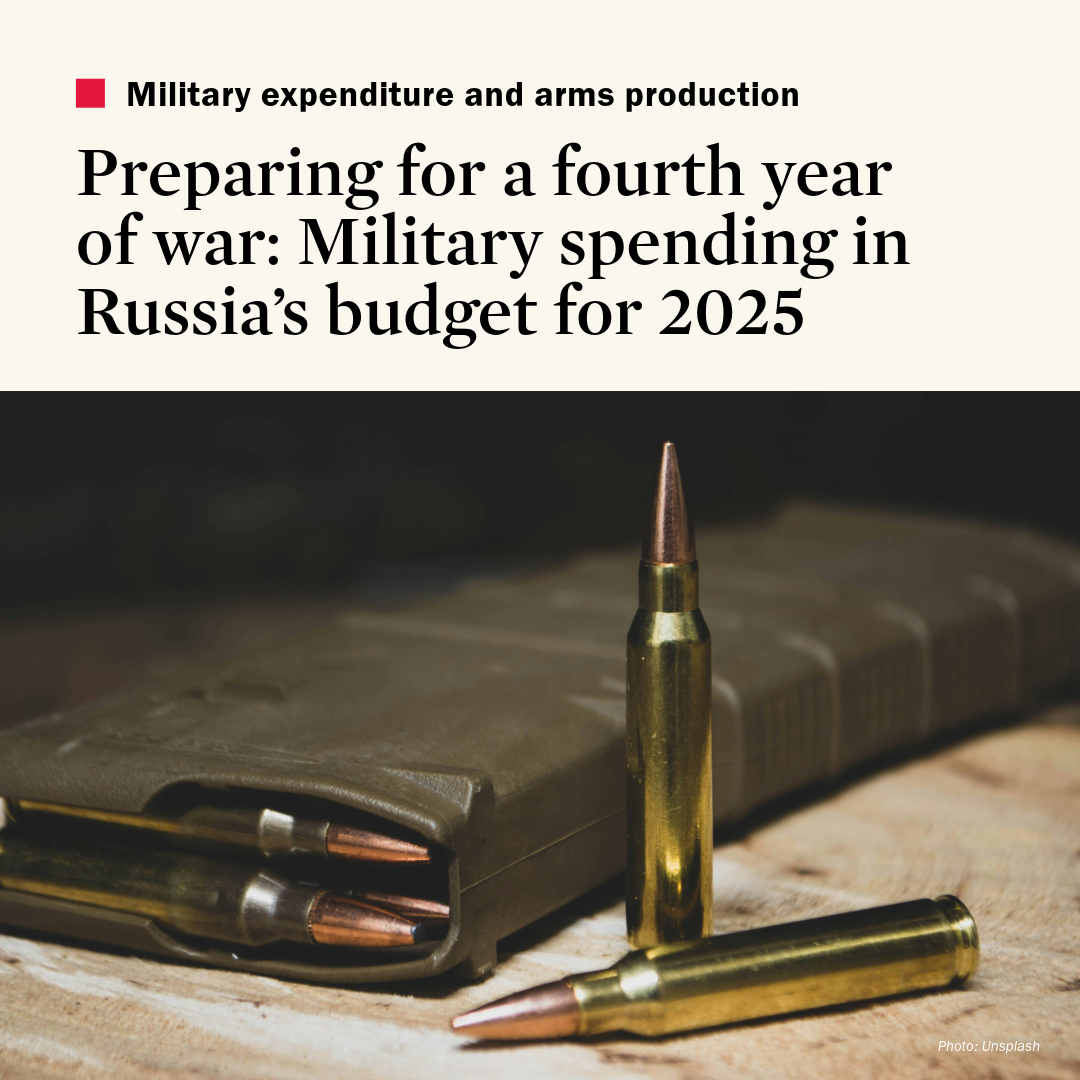 |
Preparing for a Fourth Year of War: Military Spending in Russia’s Budget for 2025
The high-intensity war that started with the Russian Federation’s full-scale invasion of Ukraine in February 2022 has now entered its fourth year. The Russian government has been devoting an ever-increasing volume of resources to the war with Ukraine. In this SIPRI Insights Paper, Russia’s total planned military expenditure in 2025 is estimated at 15.5 trillion roubles, equivalent to 7.2 per cent of gross domestic product. While this level of spending should be manageable if economic conditions do not significantly deteriorate, this paper finds that continuing this balancing act presents a challenge for Russia as non-budgetary pressures mount.
Read the SIPRI Insights Paper
|
|
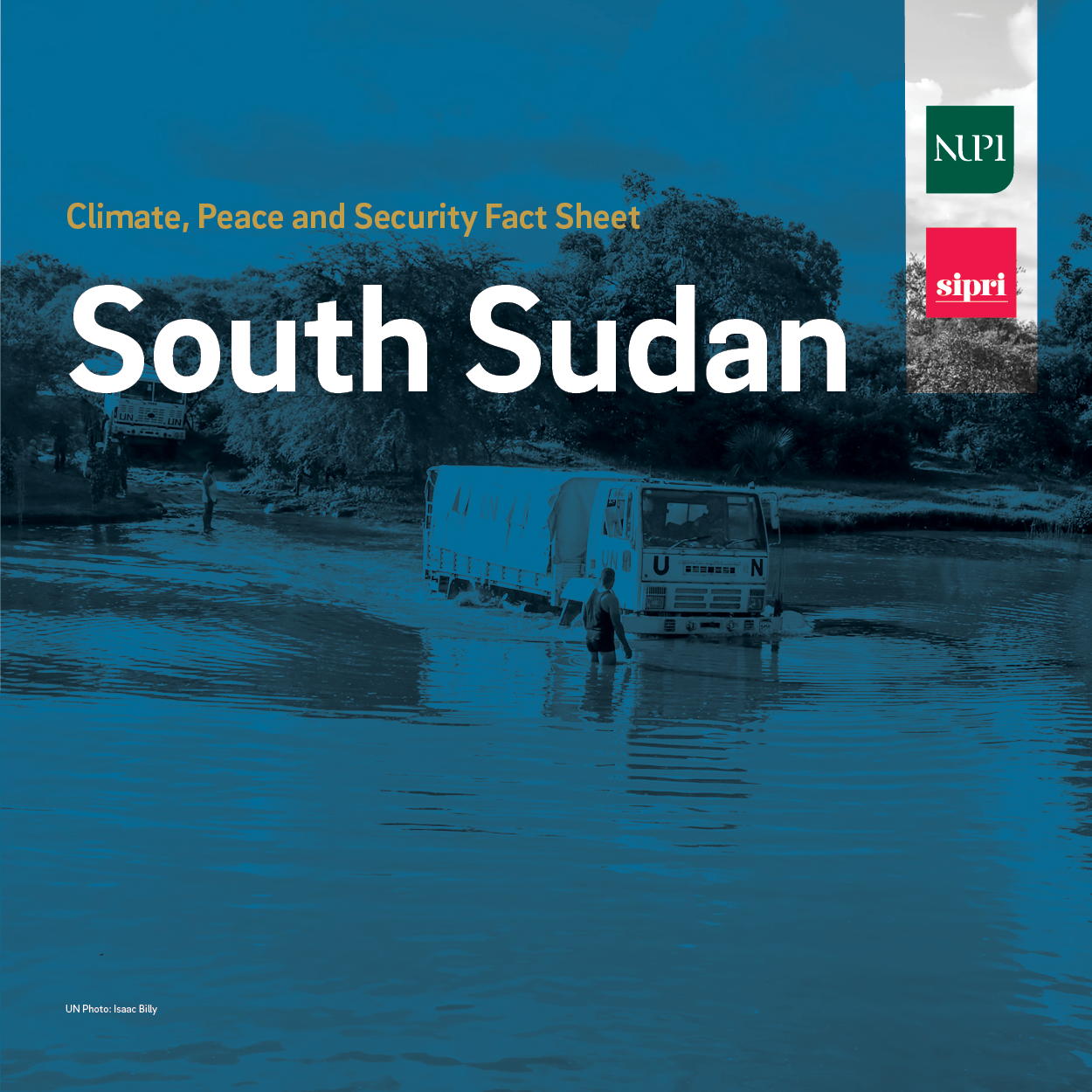 |
Climate, Peace and Security Fact Sheet: South Sudan (2025)
South Sudan is one of the least peaceful countries in the world and one of the most vulnerable to climate change. Rising temperatures and changing precipitation patterns have led to drought and flooding, decades of violent conflict have eroded the population’s coping capacities and weak governance undermines the capacity of institutions to adapt. Additionally, the spillover effects of the war in Sudan are exacerbating a complex humanitarian crisis. This Climate, Peace and Security Fact Sheet co-authored by SIPRI and the Norwegian Institute of International Affairs (NUPI) focuses on the conflict- and climate-related issues facing South Sudan and offers recommended actions to address them effectively.
Read the SIPRI–NUPI Fact Sheet
|
|
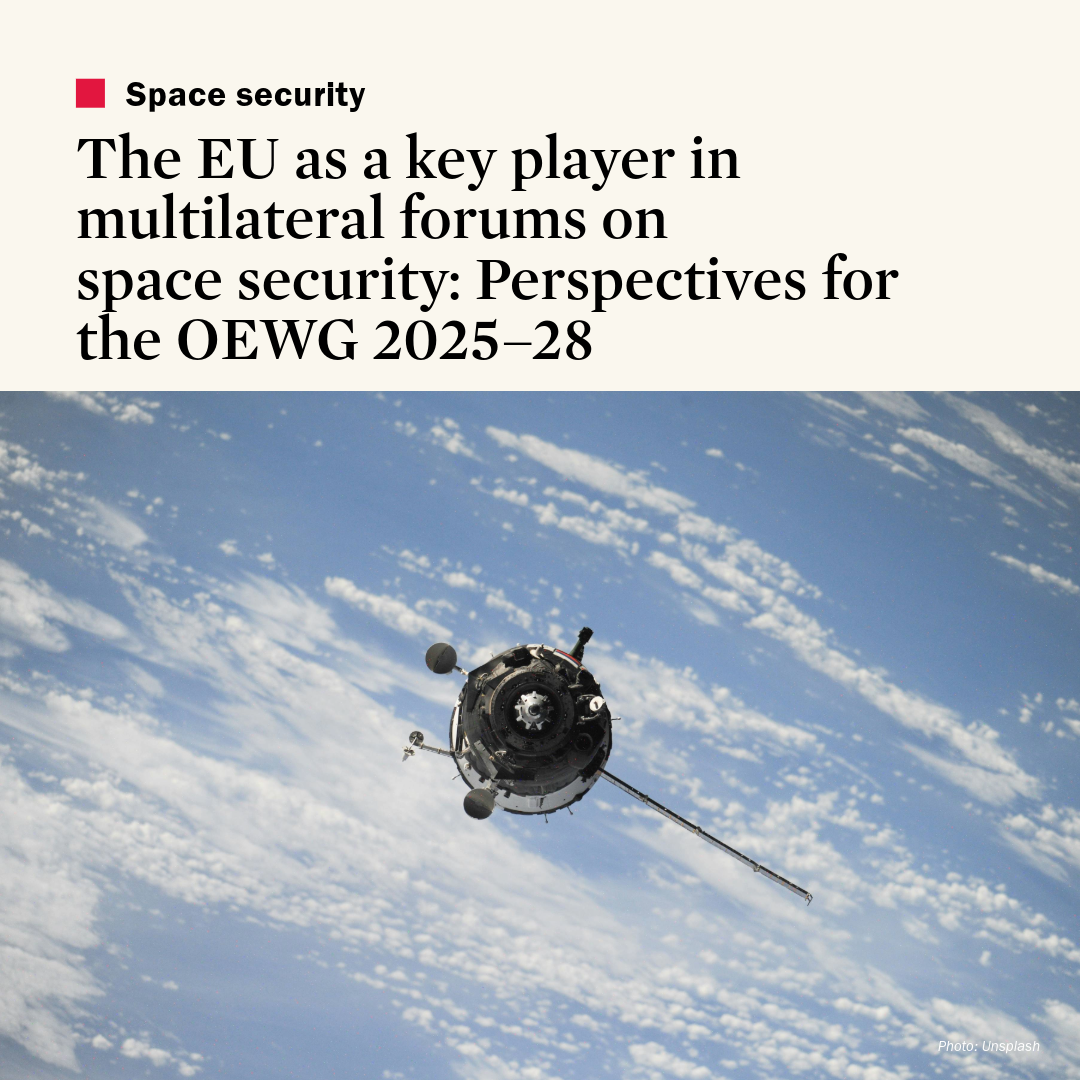 |
The EU as a Key Player in Multilateral Forums on Space Security: Perspectives for the OEWG 2025–28
There has been increased engagement at the multilateral level on the topic of space security in recent years. However, consensus has been difficult to achieve due to worsening tensions on the global stage and longstanding disagreements on space matters. In this context, the role of the EU as a community of states and a spacefaring actor in its own right needs to be elaborated. This report examines the recent evolution of EU space activities and the growing connection established by EU stakeholders between space, security and defence.
Read the report
|
|
 |
Non-proliferation, Nuclear Technology and Peaceful Uses: Examining the Role and Impact of Export Controls
The Nuclear Non-Proliferation Treaty aims to achieve nuclear disarmament, prevent nuclear weapons proliferation and promote the peaceful use of nuclear technology. To support these aims, the Nuclear Suppliers Group (NSG) has developed guidelines for export controls. While participating states have highlighted the NSG’s role as a public goods provider and enabler of peaceful nuclear trade, developing states have criticized the use of export controls as infringing on their right to access nuclear technology for peaceful uses. This report outlines the positions states have taken in these discussions and identifies steps to facilitate dialogue.
Read the report
|
|
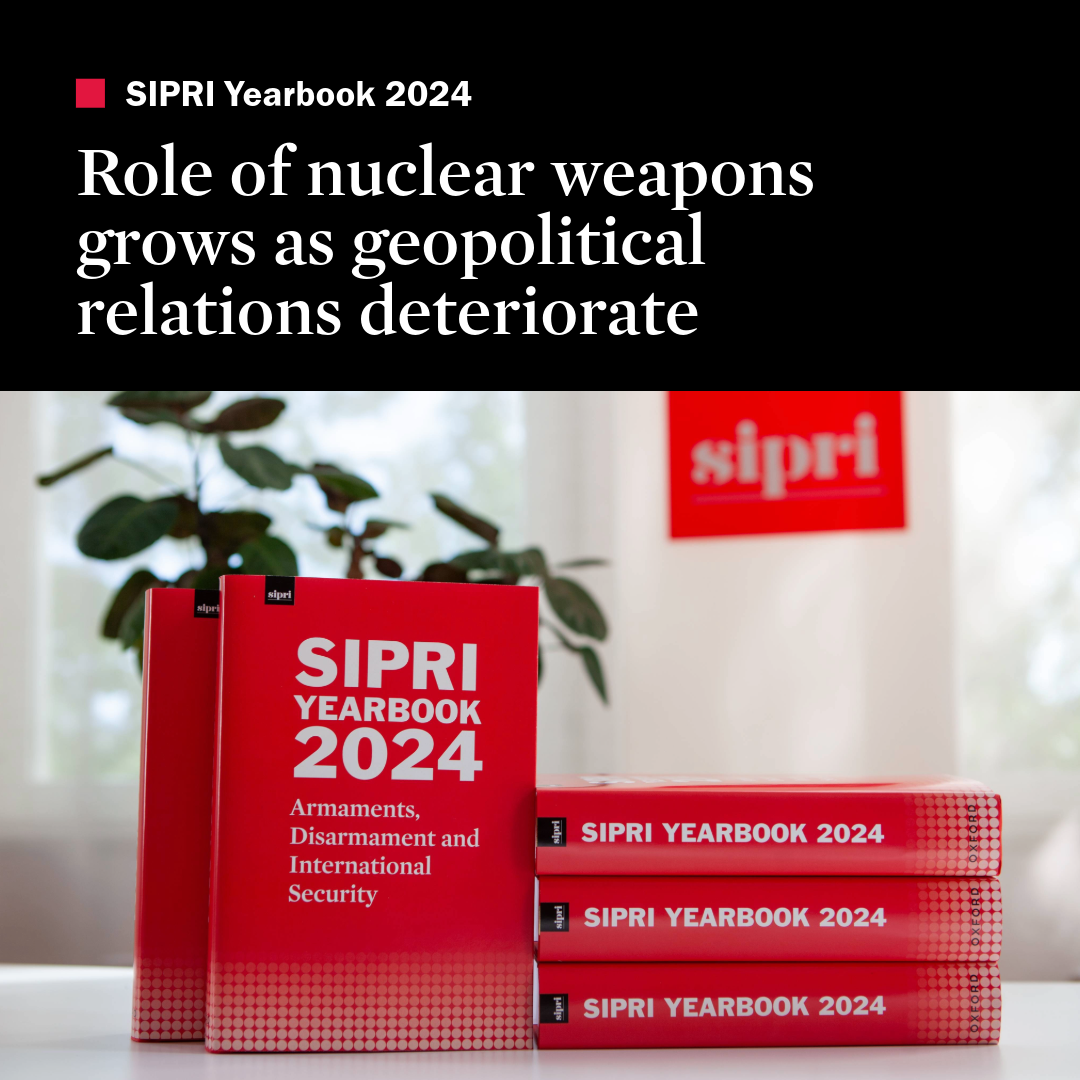 |
SIPRI Yearbook 2024
SIPRI Yearbook 2024 presents a combination of original data in areas such as world military expenditure, international arms transfers, arms production, nuclear forces, armed conflicts and multilateral peace operations, with state-of-the-art analysis of important aspects of arms control, peace and international security. In addition to its detailed coverage of nuclear arms control and non-proliferation issues, the latest edition of the SIPRI Yearbook includes:
- insight on developments in conventional arms control in 2023;
- regional overviews of armed conflicts and conflict management;
- in-depth data and discussion on military expenditure, international arms transfers and arms production; and
- comprehensive coverage of efforts to counter chemical and biological security threats.
Browse the contents page | Download the summary (PDF) | Download the sample chapter on world nuclear forces (PDF) | Download the introductory chapter (PDF) | Order SIPRI Yearbook 2024
|
|
|
Vacancies
|
- Researcher, biological weapons or biological and chemical weapons, Weapons of Mass Destructions Programme (16 May 2025)
Read more
|
|
|
|
|
|
Accurate, dependable information is more important than ever. Invest in the facts.
Support SIPRI
|
|
 |
| SIPRI is an independent international institute dedicated to research into conflict, armaments, arms control and disarmament. Established in 1966, SIPRI provides data, analysis and recommendations, based on open sources, to policymakers, researchers, media and the interested public. |
|
|